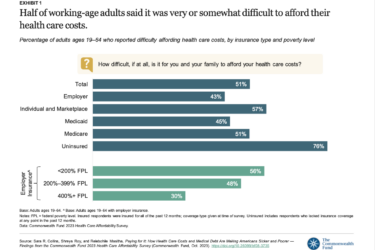
One of the most important requirements of the Affordable Care Act is that all Americans get free preventive services. This provision is significant in a health care system that regularly bills patients exorbitant amounts for many routine services designed to identify and prevent potentially significant health problem.
The provision is in jeopardy, however, according to a decision last month from Judge Reed O’Connor in the U.S. District Court for the Northern District of Texas in Fort Worth. In the case, Braidwood Management Inc. v Xavier Becerra, O’Connor ruled on March 30 that no-cost preventive health care is unconstitutional.
“The clinical implications of this ruling are real, and I think they’re being underestimated …,” A. Mark Fendrick, M.D., said April 26 during the WBUR’s On Point radio show on NPR. If the ruling stands, he predicted the health of Americans would suffer simply because all patients will need to pay out of pocket for preventive services. “And, I believe that the disparities in health care delivery that we’re fighting so hard to ameliorate will actually get worse,” he said.
On May 10, Fendrick will be our guest for a webcast on the potential effects of the ruling. As an internist, Fendrick wants his patients to get the preventive services such as screening exams that he prescribes. As a health policy professor at the University of Michigan, Fendrick wants all patients to get their colonoscopies, CT and MRI scans and cancer screenings their physicians prescribe.
Frederick will join us as the executive director of the university’s Center for Value-Based Insurance Design, which is built on the principle of lowering or removing financial barriers to essential, high-value clinical services.
This webcast is important for these reasons:
- As On Point host Meghana Chakrabarti noted, at least 150 million Americans could lose access to free preventive health care services if the ruling is allowed to stand.
- Too often, Fendrick says, patients can’t afford the services physicians prescribe for them and that health experts recommend.
- The federal Department of Justice appealed O’Connor’s ruling to the Fifth Circuit Court of Appeals in New Orleans, complicating the provision that patients can get free preventive services.
On this point, Chakrabarti asked Nicholas Bagley, a professor of law at the University of Michigan who has written extensively on the ACA, if free preventive care remains available. “It’s a little complicated,” he replied. “The short answer is yes. The longer answer is we’re not sure for how long.”
For now, O’Connor’s ruling is in effect nationwide, meaning health insurers and employers can consider whether to have workers, families and health plan members pay out of pocket for preventive care. “I think there’s at least a sentiment that maybe they want to wait and see how the case turns out,” Bagley added. For more information, see this Health Affairs article from Bagley and Fendrick, “A Texas Judge Just Invalidated The Preventive Services Mandate. What Happens Next?”
Having patients pay for preventive health services could mean many Americans would disregard their physicians’ recommendations. Last year, KFF reported that about half of U.S. adults had trouble affording health care costs, and four in ten delayed or went without medical care within the previous 12 months due to cost, according to this report, “Americans challenges with health care costs.”
Before O’Connor’s ruling, Morning Consult reported that about 40% of adults in the United States said in a survey that they were unwilling to pay for 11 of the 12 preventive services required under the ACA, and at least half would not pay out of pocket for preventive services such as tobacco cessation or screenings for HIV, depression and unhealthy drug use.











